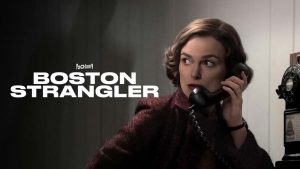THE ending of historical crime drama Boston Strangler had me scrambling for the internet.
I hadn’t realised there was such ongoing debate over the deaths of 13 women in Boston in the 1960s.
Most people of my vintage would have grown up knowing the basic history of these terrible crimes and thinking that 1968’s The Boston Strangler, with Tony Curtis as Albert DeSalvo, continued to be the definitive screen telling.
But writer/director Matt Ruskin’s 2023 film casts somewhat of a different light, fuelled by ongoing speculation and claims by an assortment of nefarious people.
I’m getting ahead of myself here because that is all in the final act whereas the main body of the film follows the two female journalists – Loretta McLaughlin (Keira Knightley) and Jean Cole (Carrie Coon) of the Boston American Record newspaper – and they break open the story.
At the start of the film Jean Cole is already somewhat of an enigma in that she has managed, by sheer force of her personality, to forge a career as an investigative journalist.
But the prevailing sexism of society at the time, including in the newsroom and police force, makes it extremely difficult for newbies like Loretta who is relegated to reviewing Sunbeam’s new toaster for the lifestyle section.
Determined to become a crime writer Loretta conducts research in her own time and finds links between several recent murders. But still the only way her editor (Chris Cooper) lets her stay on the story is by working for free.
Eventually she has to start interacting with investigating police and this brings the rampant sexism more to the fore. The editor swings Jean in to help Loretta and the pair combine to produce a series of articles that criticise the police effort and eventually help bring the killer to justice.
Knightley and Coon are strong in their roles and depict the right level of respect and rivalry that naturally exists between good journalists.
Unfortunately, the final act is a little too rushed and the range of speculative angles that I mentioned earlier feel shoe-horned into the script.
Still, for the most part this is a good procedural that holds the attention.
Make sure you also see the 1968 film in which the late Curtis, husband of Janet Leigh and father of Jamie Lee Curtis, gives possibly his best performance.
